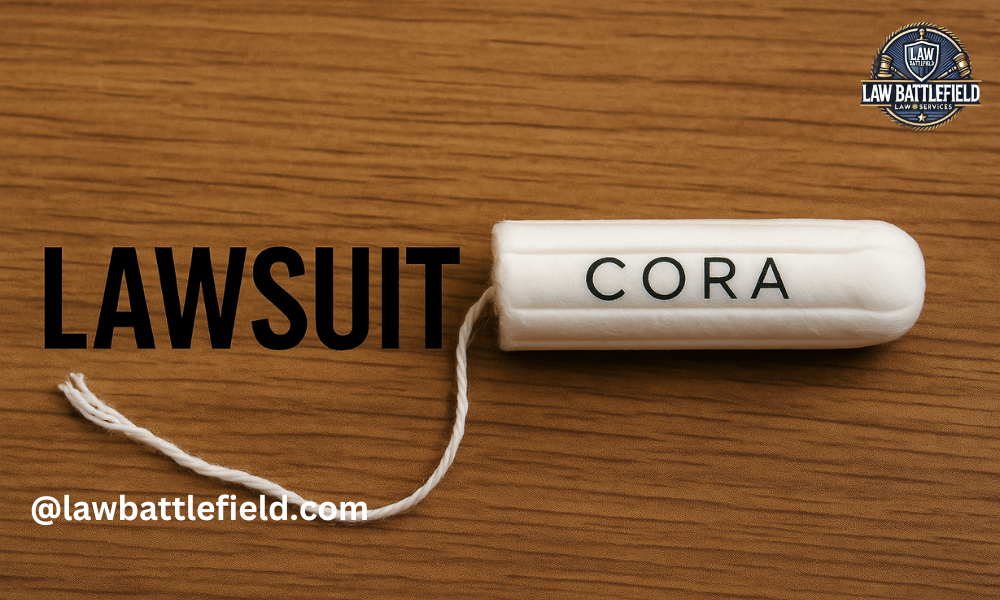In the last few years, many people have started asking tough questions about the products they use every day. One topic that has gained a lot of attention is tampon safety. Studies have shown small amounts of heavy metals in different brands, which raised concern for women who trusted these products for years. At the same time, brands that advertised their tampons as “organic” or “toxin-free” have faced lawsuits for claims that some experts believe were misleading.
This is why so many searches now include the phrase Cora Tampons Lawsuit. Cora is a well-known company that promotes natural and clean period care. Because lawsuits have been filed against other brands in the same category, many consumers wonder if Cora is also facing legal action. The phrase itself has created confusion, with some people thinking that a lawsuit already exists while others see it as a question of “if” rather than “when.”
For women looking for safe options, it is important to separate facts from rumors. Understanding why tampon lawsuits started, and why Cora’s name appears in these discussions, helps bring clarity. This article will explain what lawsuits have happened, what the science says, and where Cora stands in all of this. By the end, you will have a clear picture of whether the idea of a Cora Tampons Lawsuit is fact, speculation, or something that could happen in the future.
What Recent Tampon Lawsuits Are About
Heavy Metals In Tampons
Recent studies found that tampons from different brands contained measurable amounts of heavy metals like lead, arsenic, and cadmium. Even small amounts of these metals can create concern because tampons are used inside the body and may allow faster absorption. This discovery shocked many users who trusted tampons marketed as safe and clean.
Misleading Marketing Claims
Another reason lawsuits were filed is the language used by some companies. Words like “100% organic,” “toxin-free,” or “chemical-free” look reassuring on the box. But investigations showed that some products had materials or additives that did not match the promises. Consumers argued that this type of advertising misled them into believing the products were safer than they really were.
Product Safety Defects
Some lawsuits focus on how tampons are made. There are reports of tampons shedding cotton fibers or breaking apart inside the body. In certain cases, women claimed they suffered irritation, injury, or infection because of these defects. Lawyers argue that brands failed to design products that protect users from these risks.
Brands That Have Faced Litigation, And The Legal Grounds
Example Brands Named In Lawsuits
Several well-known tampon brands have already been pulled into legal action. Cases have been filed against Procter & Gamble’s L. Inc., LOLA (Alyk, Inc.), Kotex, and Tampax. These brands were accused of either hiding safety risks or making claims that were not fully true. Because many of these products are popular and trusted, the lawsuits attracted wide public attention.
Main Legal Claims Against These Brands
The legal arguments follow a clear pattern:
- False advertising – Companies are accused of using words like “organic” or “chemical-free” when the products did not meet those promises.
- Breach of warranty – Shoppers believe they paid for a safe, reliable product but received something different, which breaks the company’s guarantee.
- Product liability – Claims that the tampon itself caused harm, such as infections or injuries, because of poor design or unsafe materials.
- Consumer protection violations – Lawsuits argue that companies broke basic rules that protect buyers from unfair or deceptive practices.
The Status Of Cora: Has Cora Ever Been Sued?
No Active Lawsuit Against Cora
As of 2025, there is no active class action lawsuit filed against Cora. While many tampon brands have faced legal action for safety concerns or misleading labels, Cora has not been officially named in any case. This is an important point because the phrase “Cora Tampons Lawsuit” often shows up online, which can confuse readers into thinking a case already exists.
Rumors And Speculation
The reason Cora appears in these conversations is mainly due to online discussion and social media speculation. When lawsuits are filed against other organic tampon brands, people often group Cora into the mix, even without direct evidence. This “guilt by association” creates uncertainty, especially for women who want safe and clean options.
Why Cora Comes Up In “Tampon Lawsuit” Discussions
Consumer Anxiety And Guilt By Association
When lawsuits target big names like Kotex or Tampax, consumers start looking at every brand in the same way. Cora gets mentioned often because it also promotes itself as a clean and organic option. Even without proof of wrongdoing, many people assume Cora could face the same issues as the other brands.
Misreading Of Scientific Studies
Research about heavy metals in tampons did not always list brand names. This led to confusion online. People saw the results and guessed which companies might be involved. Without brand-specific testing, rumors spread quickly, and Cora’s name sometimes gets linked to findings that do not directly mention it.
High Expectations From “Clean” Marketing
Cora uses strong language around words like “organic,” “natural,” and “toxin-free.” These promises raise consumer expectations. If customers hear about lawsuits against other “organic” brands, they often wonder if Cora is truly different. This gap between marketing and trust is one reason why Cora is part of the lawsuit discussions, even without an actual case.
Could Cora Face A Lawsuit In The Future?
Possible Risk Factors
Even though Cora has not been sued yet, it still faces risks like other tampon brands. Heavy-metal contamination in raw cotton or during production could create problems if testing finds unsafe levels. Another risk is incomplete ingredient disclosure. If a label says “organic” or “toxin-free” but includes hidden additives, that could lead to legal action. Reports from users about irritation, shedding fibers, or product defects can also open the door for claims.
Gaps In Regulation
Tampons are regulated as medical devices, but the rules are not very strict. Companies are not always required to list every ingredient or test for heavy metals. Some states have started pushing for stronger laws and ingredient-transparency rules. As more regulations appear, brands that do not adjust may face greater legal exposure.
How Cora Can Reduce Legal Risk
Cora can protect itself by taking steps before a lawsuit ever happens. Independent laboratory testing and public results help build trust. Certifications from credible organizations can prove that claims like “organic” are real. Clear labeling and honest marketing remove doubt. Open communication with customers about product safety also helps reduce speculation and keeps the brand ahead of potential problems.
What Consumers Can Do To Stay Safe (And Informed)
Check For Trusted Certifications
When buying tampons, look for labels backed by reliable organizations. Standards like organic textile certifications or independent toxicology testing give extra proof that a product is safe.
Review Lab Test Results And Ingredient Lists
Some brands publish lab results or full ingredient disclosures on their websites. Taking a few minutes to check this information helps you see if the product matches the claims on the box.
Pay Attention To User Feedback
Reviews and reports from other users can highlight issues that might not be easy to see in ads. If many people report irritation, shedding, or safety concerns, it may be a sign to look at other options.
Try Different Product Types
Switching between tampons, pads, menstrual cups, or reusable products can reduce constant exposure to one material. It also helps you find what works best for your body.
Stay Updated On News And Rules
Menstrual product safety is getting more attention from health experts and lawmakers. Keeping up with new research or changes in regulations helps you make safer choices in the long run.
Weighing Concern With Evidence: The Reality Behind The “Cora Tampons Lawsuit”
No Lawsuit Confirmed Against Cora
As of 2025, there is no verified lawsuit against Cora tampons. The phrase “Cora Tampons Lawsuit” often shows up in online searches, but it reflects speculation rather than fact. While other tampon brands have faced legal cases, Cora has not been formally named.
Consumer Concern Is Still Valid
Even without a lawsuit, consumer worry is understandable. Studies showing heavy metals in tampons and lawsuits against competing brands have raised awareness. Shoppers want safety, honesty, and proof that products meet the claims on their labels. This growing scrutiny pushes all companies, including Cora, to keep standards high.
The Role Of Transparency And Facts
Speculation should not replace facts. Both consumers and brands benefit from clear communication, testing, and open data. Brands that share lab results and ingredients build trust, while consumers who research and stay informed make stronger choices. This balance helps reduce confusion and keeps the conversation focused on evidence.
Conclusion
The idea of a Cora Tampons Lawsuit has gained attention online, but as of now it is more rumor than reality. No case has been filed against Cora, though the brand often gets mentioned because other organic tampon companies have faced lawsuits.
At the same time, the wave of tampon-safety litigation shows how important honest marketing and product testing have become. Women want to trust the products they use, and brands must meet that need with transparency and clear evidence of safety.
For consumers, the best step forward is to stay informed, check labels, and follow new research about menstrual health. For brands, the message is simple: be open, test products thoroughly, and communicate clearly. By doing so, companies like Cora can maintain trust, and shoppers can feel more confident in their choices.
FAQs
Is There A Lawsuit Against Cora Tampons?
No. As of 2025, there is no verified lawsuit against Cora tampons. The phrase “Cora Tampons Lawsuit” appears online mostly because of speculation.
Why Do People Think Cora Is Involved In Lawsuits?
Cora gets mentioned because other organic tampon brands have faced legal cases. Many consumers link Cora by association, even without proof of wrongdoing.
What Are The Main Reasons Tampon Brands Get Sued?
Most lawsuits focus on heavy-metal contamination, misleading advertising like “100% organic” or “toxin-free” claims, and product safety defects such as shedding or irritation.
Could Cora Face A Lawsuit In The Future?
Yes, it is possible. If testing ever shows unsafe materials, incomplete labeling, or product defects, legal action could happen. At the moment, there is no case.
How Can Consumers Stay Safe When Choosing Tampons?
Look for third-party certifications, check if brands share ingredient lists or lab test results, read user reviews, and stay updated on new safety research.
Was this article helpful? Check out more on Lawbattlefield.com
Disclaimer: This article is for informational purposes only and does not provide medical, legal, or professional advice. The topic of a “Cora Tampons Lawsuit” is based on public reports and consumer discussions as of 2025. At the time of writing, no verified lawsuit has been filed against Cora. Readers should not interpret this content as confirmation of any legal claim or product defect. If you have concerns about your health, please consult a qualified healthcare professional. For legal questions, seek guidance from a licensed attorney.
Inside The Reddit Regatta Beach Club Clearwater Lawsuit: What Really Happened?





